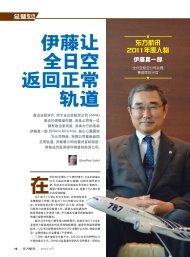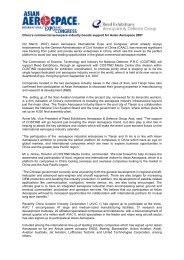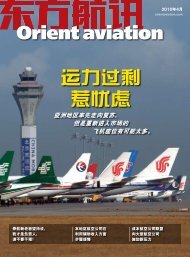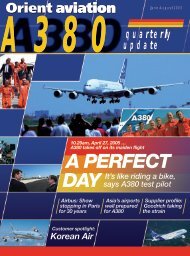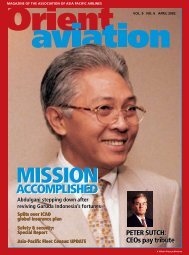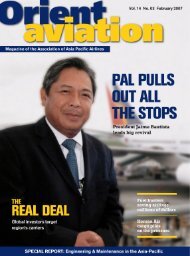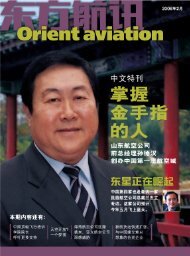c o u n t r y f o c u sJAMMED!Congestion puts Japan’s regional hub status under threatJapan’s great airport debate is set tointensify amid growing doubt plannedexpansion measures will bring relief toTokyo’s desperately congested runways orease concern that the country’s status as aregional aviation hub is under threat.Flashpoints are emerging over future U.S.airline access to the New Tokyo InternationalAirport at Narita and the internationalisationof the city’s domestic Haneda terminal.At the same time, construction of asecond runway at Osaka’s main gateway,Kansai, appears set to be delayed becauseof funding doubts, while there are calls fora wider, rational debate on national airportplanning.Narita’s long-awaited second runway isscheduled to open in May 2002, but sources atJapan’s major airlines said they are preparingto fight tooth and nail to prevent significantadditional capacity being granted to Americanoperators, which hold a third of Narita slots.They also are pushing to prevent wideruse of Haneda – recently opened to internationalcharter services and corporate flightsthrough the night – for offshore flights. Japanesecarriers want another runway built atHaneda, but they insist all additional capacityshould be reserved for domestic operations.Meanwhile, intense lobbying continuesover another sore point among airlines, thehigh aeronautical fees – three times the worldaverage – charged at Japanese airports.Overall, there is growing demand that thegovernment formulate a broad, nationwideairports plan. As reported in <strong>Orient</strong> <strong>Aviation</strong>in February, Japan Airlines (JAL) president,Isao Kaneko, who chairs the Scheduled AirlinesAssociation of Japan (SAAJ), has calledfor a “grand design” to replace the presentpiecemeal approach to airport expansion.Many airport decisions are mired in politicaldebate, which has led to the construction ofseveral expensive, but under-utilised facilitiesat regional centres. Decisions have often beentaken, then overturned, and then reversed.Osaka is a prime example. When the biginternational facility was built on a man-madeisland in Osaka Bay, off Kansai, the existingairport at Itami was supposed to have closed.It remains open and is busier than ever.Now, a third airport is being built in thesame area, at Kobe. At the same time, the governmentis undertaking a review of a projectto build a second runway at Kansai, apparentlyover concerns the high cost will burdenthe Kansai International Airport Company(KIAC) with too much debt. KIAC is strugglingfinancially after losing money for four straightyears and traffic volume through Kansaihas been lower than anticipated. When thesecond runway was approved in 1996, KIACThe take-off queue at Haneda Airport outside Tokyoprojected 150,000 arrivals and departures infiscal 2000. The Transport Ministry estimatesthe number was around 120,000.While Osaka has its own planning problems,the future of Tokyo’s airports remainsat the heart of Japan’s aviation problems.The country’s airlines have been upset foryears over the high access U.S. carriers haveto Narita. With up to 40 countries queued upfor slots, JAL’s Kaneko believes allocation ofadditional capacity when the second runwayopens next year should be heavily weightedaway from the U.S. He points out that at thehub facility of most nations local operatorshave up to 50% of slots. At Narita, Japaneseairlines have only 38%. Kaneko wants thatshare increased, with most of the remaindergoing to countries other than the U.S.The problem for Japan’s air authorities isthat sort of approach could likely spark a furiousrow with Washington at a time delicatenegotiations will be continuing about a newJapan-U.S. air accord.In reality, the second Narita runway doesnot solve many of the airport’s problems. It isshort, only 2,180 metres (7,500 ft), so it cannotbe used for long-haul jumbo jets. However,U.S. carriers will undoubtedly want slots forsmaller planes to operate onward flights fromTokyo to other Asian ports.Haneda presents another challenge.While JAL, All Nippon Airways and Japan AirSystem welcome the decision to open theairport between 11pm and 6am for internationalcharter flights – services to leisuredestinations such as Hawaii and Guam – theyare adamantly opposed to a wider internationalisationof the airport.That also will cause some diplomatic angstfor aviation officials. South Korean president,Kim Dae-jung, has asked Japan to move quicklyto allow scheduled international services; hewants clearance for shuttle flights betweenSeoul and Haneda as a means of relievingcongesting on the Seoul-Narita route.Japanese airlines argue Haneda is fully utiliseddomestically and that for the foreseeablefuture they will need any additional capacityfor domestic expansion.The SAAJ view is apart from Narita’s secondrunway, another runway is required atHaneda and a third airport must be planned. Itwants a full-scale debate involving professionals,not only to look at the airport expansionbut also to look at ways to solve the desperateneed for fast transport links between Narita,Haneda and any third facility, and on to Tokyocity. If Japan is to maintain its position as aprimary Asia-Pacific airline gateway, againsttough competition it has to move quickly toresolve these issues.If it fails, congestion at Tokyo will simplydeteriorate into the point of gridlock.38 | <strong>Orient</strong> <strong>Aviation</strong> | March 01
Near-miss planes just 10 metres apartpreliminary investigation into the near miss of two JapanA Airlines (JAL) planes over Yaizu, 176 kilometres from Tokyo,in January, has revealed that a trainee air traffic controller and asupervisor working with him had incorrectly identified the aircraft.The jets, carrying a total of 677 passengers and crew passed within10 metres of each other.Allegedly the B747-400, Flight JL907, was ordered to descendby the controller who had mixed up the flight numbers. Whenthe Traffic Alert and Collision Avoidance System (TCAS) alarmsounded the captain made an emergency dive. Forty two peopleof the 427 on board suffered injuries ranging from bone fracturesto scalding. No one was injured on the second aircraft, a DC-10carrying 250 people.The incident was officially declared an accident by the JapanCivil <strong>Aviation</strong> Bureau of the Ministry of Land, Infrastructre andTransportation.JAL and All Nippon Airways are introducing an advancedversion of TCAS as a result of the near miss. The police havesaid they will determine whether the controllers bear criminalresponsibility after comparing the account given by CaptainMakoto Watanabe, the 41-year-old pilot of the B747, with recordsof the communications he had with the controllers.Blame and punishmentand Flight JL907A Special Correspondent in Tokyoanalyses aircraft accident culture inJapan and the disturbing role the policeplay in it.In the afternoon of January 31, two JapanAirlines (JAL) aircraft were involved in anear miss incident over Yaizu, 176 kilometres(110 miles) south-west of Tokyo. One ofthe aircraft, domestic B747-400 flight JL907 enroute to Okinawa with 427 people on board,made an emergency dive resulting in injuriesto 42 passengers and cabin attendants.Captain Makoto Watanabe promptlyturned his aircraft back to Tokyo’s HanedaAirport. The other aircraft, JAL DC-10 flightJL958 from Pusan to Tokyo with 250 on board,landed without problems at Narita Airport.In early media reports, the Japanese policewere quoted as saying they would investigatethe case to find who was responsible with aview to arresting and punishing them. UnderJapan’s laws airline accidents involving injuryor death are automatically investigatedunder the criminal code in much the sameway as road traffic accidents. Participantsare investigated as if they are involved in apotential crime for “professional negligenceresulting in injuries”. Such attitudes are deeplyrooted in Japanese society.In the case of JL 907 the police were alreadyat work. A three-man squad, notebooksat the ready, was waiting when the B747Japan Airlines: captain of near miss plane grilled by the police in the cockpit immediatelyafter he landed his aircraftlanded. They boarded, entered the cockpitand for one hour questioned the pilots, interruptingtheir post flight checks. Injuredpassengers were still on the aircraft and thepolice intervention prevented the captainand co-pilot from performing their basic andmandatory duty of making official reports onthe near miss.Witnesses said the investigators seemedto take the position that the cockpit of theB747-400 was the scene of a crime and the occupantspossible, if not probable, suspects.Later that evening the captains of the twoflights said, on union advice, that they wouldsubmit their reports to police only throughattorneys. They later gave briefings in full tocompany personnel.These events demonstrate that in Japan,the police play a dominant – some say dominating– role from the very beginning whereaccidents are concerned, taking a stance whichdiscourages openness in those involved in theincident, impedes the resolution of the technicalenquiry and jeopardises future preventionof an incident or accident.The president of the 5,400 strong JapanFederation of Flight Crew Unions and an AllNippon Airways captain, Kazuhiro Kawamoto,said by their haste in seeking to apportionblame or liability, the Haneda police actioncontravened the basic spirit of the InternationalCivil <strong>Aviation</strong> Organisation (ICAO)March 01 | <strong>Orient</strong> <strong>Aviation</strong> | 39




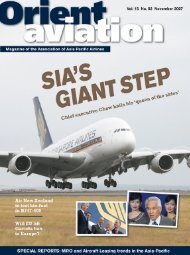
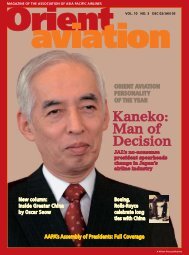
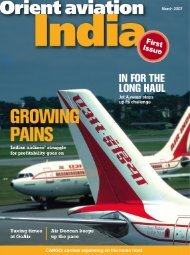
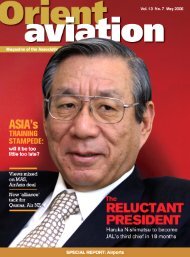
![OAMag-V7N4-Cover [Converted] - Orient Aviation](https://img.yumpu.com/48598575/1/190x255/oamag-v7n4-cover-converted-orient-aviation.jpg?quality=85)
